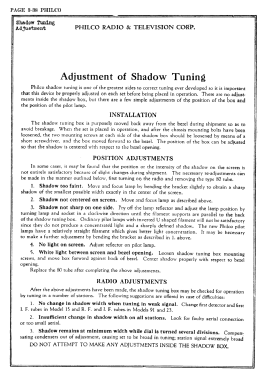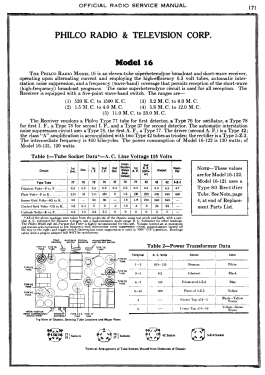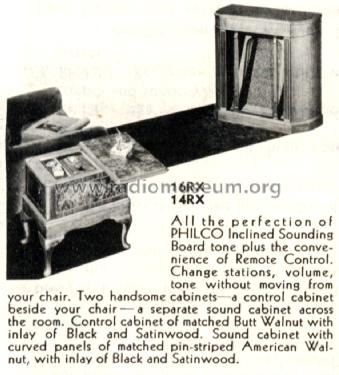16RX (16, 16A) Early
Philco, Philadelphia Stg. Batt. Co.; USA
- Land
- USA
- Hersteller / Marke
- Philco, Philadelphia Stg. Batt. Co.; USA
- Jahr
- 1933/1934
- Kategorie
- Rundfunkempfänger (Radio - oder Tuner nach WW2)
- Radiomuseum.org ID
- 18820
Klicken Sie auf den Schaltplanausschnitt, um diesen kostenlos als Dokument anzufordern.
- Anzahl Röhren
- 11
- Hauptprinzip
- Superhet allgemein; ZF/IF 460 kHz
- Wellenbereiche
- Mittelwelle und mehr als 2 x Kurzwelle.
- Betriebsart / Volt
- Wechselstromspeisung / 115 Volt
- Lautsprecher
- Dynamischer LS, mit Erregerspule (elektrodynamisch)
- Belastbarkeit / Leistung
- 10 W (Qualität unbekannt)
- Material
- Gerät mit Holzgehäuse
- von Radiomuseum.org
- Modell: 16RX [Early] - Philco, Philadelphia Stg. Batt
- Form
- Standgerät: Sesselkonsole (Sesselsuper).
- Bemerkung
-
The model 16 series were high-end multiband radios. The early chassis used in 1933-34 had five bands covering 520 kHz to 23 MHz, and also included a QAVC ("quiet automatic volume control") squelch circuit to silence noise between stations (with a switch on the side and a control on the back to adjust the QAVC). The late version (1934-35) of the chassis covered a similar tuning range, but with only four bands, and eliminated the QAVC feature. Both the early and late chassis used a type 80 rectifier tube for the more compact 16B models, and a type 5Z3 for larger models. Both chassis included a shadow meter (tuning aid). Both chassis also were available in a version for 25-40 Hz power, and these chassis are marked as "16A" (where the -A suffix is a chassis suffix, not to be confused with the cabinet suffix on the main model number).
The chassis codes are as follows:
Code 121: early chassis with 80
Code 122: early chassis with 5Z3
Code 123: unknown
Code 125: late chassis with 80
Code 126: late chassis with 5Z3
Code 127: unknown
There were fifteen versions of model 16 in different cabinet styles over a three year span: four versions of the 16B cathedral/tombstone, three versions of the 16L lowboy, four versions of the 16X floor-type console, three versions of the 16RX chairside, and a special 16CPX chairside.
Version 1 (1933-34) of model 16B was a cathedral (early chassis); version 2 (1934) was a gently peaked tombstone (early chassis); version 3 (1934) was a slightly updated tombstone with a somewhat more steeply peaked top (late chassis); version 4 (1935) is a flat-topped shouldered tombstone (late chassis).
The early version (1933-34) of the 16L lowboy has four vertical bars through the speaker opening and an arched control panel (early chassis). The middle version (1934) has V-shaped bars in the speaker opening and hexagonal knobs (early chassis). The late version (1934-35) had the same cabinet as the middle, but with the late chassis.
Version 1 (1933) of the 16X console had a large open speaker grill on an inclined sounding board (early chassis). Version 2 (1934) had three round vertical bars in front of the speaker opening and patterned moulding around the top of the cabinet (early chassis). Version 3 (1934) had a more "modern" style with three square vertical bars in front of the speaker and no moulding around the top (early chassis). Version 4 (1934-35) kept the same cabinet, but used the late chassis.
The early version (1933-34) of the 16RX chairside had a control unit on legs with a top that swiveled to reveal the controls and a large separate speaker cabinet (early chassis). Version 2 (1934) had a more modern design, the control unit having no legs (or very short) and the speaker cabinet having a lightning bolt pattern on the speaker grill (early chassis). Version 3 (1934-35) kept the same cabinet, but used the late chassis.
The 16CPX was a special chairside model commemorating the "Century of Progress" and is rare or nonexistant today. The modern-style cabinets had veneers of Madagascar ebony and myrtle burl, with catalin and stainless steel trim. Only 750 units were manufactured. The 16CPX has the early chassis.
- Originalpreis
- 195.00 $
- Datenherkunft extern
- E. Erb 3-907007-36-0
- Schaltungsnachweis
- Die «Thali Schemasammlung» führt das Modell.
- Literaturnachweis
- Philco Radio 1928-1942 (Rider's Perpetual, Vol. 4)
- Literatur/Schema (1)
- Philco 1928-36 Wiring Diagrams, Parts Lists, and Essential Service Data
- Literatur/Schema (3)
- Philco Folder for 1933/34.
- Weitere Modelle
-
Hier finden Sie 4126 Modelle, davon 2231 mit Bildern und 3774 mit Schaltbildern.
Alle gelisteten Radios usw. von Philco, Philadelphia Stg. Batt. Co.; USA























